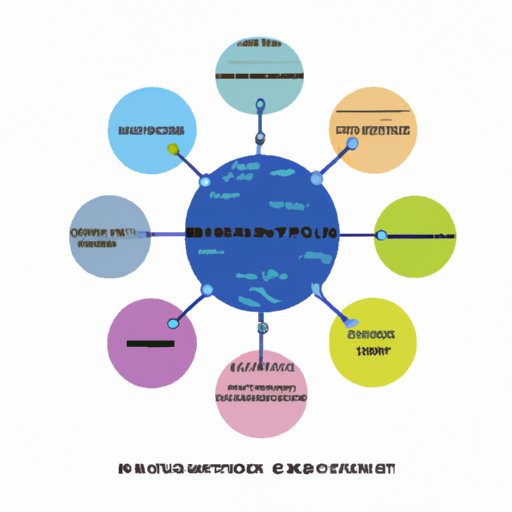Introduction
An ecosystem is a complex network of living organisms and their physical environment that interact with each other to form a stable system. In environmental science, an ecosystem refers to a biological community of interacting organisms and their non-living environment. It is a dynamic and ever-changing entity that is made up of many different elements. This article will explore the interconnectedness of an ecosystem, the types and components of an ecosystem, and the effects of human-made changes on an ecosystem.
Exploring the Interconnectedness of an Ecosystem
In order to understand the complexity of an ecosystem, it is important to examine the types and components of an ecosystem. An ecosystem consists of two main types of factors: abiotic factors (non-living components) and biotic factors (living components). Abiotic factors include air, water, sunlight, temperature, soil, and minerals, while biotic factors include plants, animals, and microorganisms.
The biotic factors are responsible for maintaining the balance and stability of the ecosystem. They are connected to one another through a food web, which is a network of interconnected food chains. Plants produce energy from the sun through photosynthesis, which is then passed along to animals that consume the plants. Microorganisms break down organic material to release nutrients back into the soil, which can be used by plants again.
Biodiversity is also an important element of an ecosystem. Biodiversity refers to the variety of species within an ecosystem and the interactions between them. A healthy ecosystem has a high level of biodiversity, as this ensures a stable balance of the ecosystem. Studies have shown that higher levels of biodiversity result in healthier and more productive ecosystems. For example, a study conducted by Nature Communications found that “increases in biodiversity lead to increases in productivity, nutrient cycling and resistance to disturbance” (Nature Communications, 2018).
Analyzing the Effects of Human-Made Changes on an Ecosystem
Human activities can have a significant impact on ecosystems, both positive and negative. Climate change is one of the most significant human-induced changes to ecosystems. Rising temperatures, increasing ocean acidity, and extreme weather events are all having an adverse effect on ecosystems around the world. As temperatures rise, habitats are destroyed and species are forced to migrate or face extinction. This disruption of the natural balance of an ecosystem can lead to a decrease in biodiversity and a decrease in the productivity of the ecosystem.
Protecting and preserving ecosystems is essential for maintaining a healthy environment. By conserving and restoring habitats, reducing pollution, and limiting human activities that damage ecosystems, we can help ensure that ecosystems remain healthy and productive. Conservation efforts have been shown to have positive effects on ecosystems. For example, a recent study published in Science Advances showed that “conservation efforts can reduce the impacts of climate change on biodiversity and improve ecosystem functioning” (Science Advances, 2019).
Conclusion
In conclusion, an ecosystem is a complex and interconnected network of living and non-living components that work together to create a stable and balanced system. Understanding the types and components of an ecosystem, as well as the role of biodiversity, is essential for understanding how ecosystems work. Human-made changes to ecosystems, such as those caused by climate change, can have a significant negative impact on ecosystems. Protecting and preserving ecosystems is therefore essential for ensuring the health and productivity of our planet.
(Note: Is this article not meeting your expectations? Do you have knowledge or insights to share? Unlock new opportunities and expand your reach by joining our authors team. Click Registration to join us and share your expertise with our readers.)
